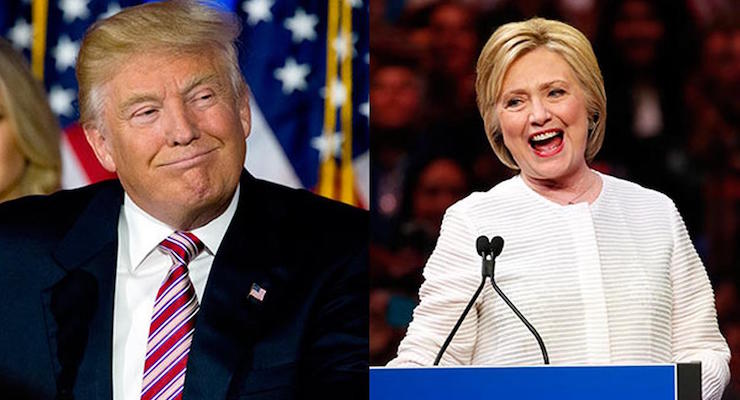

Presumptive nominees Donald J. Trump, left, and Hillary R. Clinton, right, give victory speeches on Tuesday, June 7, 2016, in New York. (Photos: AP)
It’s not easy being a libertarian, especially in election years.
 Do you choose not to vote because you either reject your choices or even the entire principle of majoritarianism?
Do you choose not to vote because you either reject your choices or even the entire principle of majoritarianism?- Do you vote for the Libertarian Party even though that historically is nothing more than an ineffective way of sending a message?
- Or do you strategically cast a vote for a major-party candidate, fully aware that such a person inevitably will be a disappointment in office?
If you’re normally in the last category, 2016 will be especially difficult.
Let’s start with Trump. On the positive side, he’s proposed a good package of tax cuts. And he’s…….ummm……..errrr……well……(scratch head)……
Actually, in terms of specifics rather than rhetoric, the tax cut is about the only market-oriented policy he’s embraced.
On the negative side, he’s a big fan of protectionism, and that’s definitely not a recipe for prosperity. And he’s rejected much-need reforms to entitlement programs, which therefore makes his big tax cut totally unrealistic.
But mostly it’s impossible to know what he really thinks for the simple reason that he probably doesn’t have deep thoughts about public policy (look at his flailing response to the question of debt). Even when he’s been specific, does anyone think he’s philosophically committed to what he has said while campaigning?
So, my assessment, as explained in this interview with Neil Cavuto, is that Trump is a grenade that will explode in an unpredictable fashion.
[brid video=”43917″ player=”2077″ title=”Dan Mitchell Commenting on the Political Meaning of Trump”]
So if you’re a libertarian and you choose to vote for Trump, just be forewarned that you’ll probably be standing next to the grenade when it explodes.
So what about the alternative? Is there a libertarian argument for Hillary Clinton (other than the fact that she’s not Trump)? Can a politician who has spent decades promoting cronyism and redistributionism actually deliver good policy?
Her husband actually did a good job when he was in the White House, but you can probably sense from this debate with Juan Williams on the Stossel show, I’m not overflowing with optimism that she also would preside over a shift to better policy.
[brid video=”43919″ player=”2077″ title=”Dan Mitchell Debating Hillarynomics on Stossel”]
Here are a few additional thoughts on my debate with Juan.
Keynesian economics doesn’t work, either in theory or in reality. And it’s laughable that the excuse for Keynesian failure is always that politicians should have spent more money.
 Entitlements will cripple America’s economy if left on auto-pilot. I’ve repeatedly made the point that we’re like Greece 10 or 15 years ago. By claiming at the time that there was no crisis, Greek politicians ensured that a crisis eventually would occur. The same thing is happening here.
Entitlements will cripple America’s economy if left on auto-pilot. I’ve repeatedly made the point that we’re like Greece 10 or 15 years ago. By claiming at the time that there was no crisis, Greek politicians ensured that a crisis eventually would occur. The same thing is happening here.
I’m skeptical about the claim that climate change is a crisis, but a revenue-neutral carbon tax is the most sensible approach if action genuinely is required. But the left prefers sure-to-fail (but very lucrative to cronies)industrial policy.
Government can help create conditions for prosperity by providing core public goods like rule of law, but that only requires a very small public sector, not the bloated Leviathans that exist today.
I’d be delighted to have a woman as President if she had the same principles and judgement as Margaret Thatcher. To be colloquial, that ain’t a description of Hillary Clinton.
 Last but not least, I was rhetorically correct but technically wrong about welfare dependency in Hong Kong. I said fewer than 3 percent of Hong Kong residents get public assistance when I should have said that Hong Kong spends less than 3 percent of GDP on redistribution. That’s an amazingly small welfare state, but it does ensnare about 5.5 percent of the population. Which if far lower than the share of the population getting handouts in America, so my point was still very much correct.
Last but not least, I was rhetorically correct but technically wrong about welfare dependency in Hong Kong. I said fewer than 3 percent of Hong Kong residents get public assistance when I should have said that Hong Kong spends less than 3 percent of GDP on redistribution. That’s an amazingly small welfare state, but it does ensnare about 5.5 percent of the population. Which if far lower than the share of the population getting handouts in America, so my point was still very much correct.
Not that any of this matters in the short run since there’s a 99.9 percent probability that America’s next President will be perfectly content to let the country sink further into the swamp of statism.






Don Lovell / June 29, 2016
Dan Mitchell for President
/